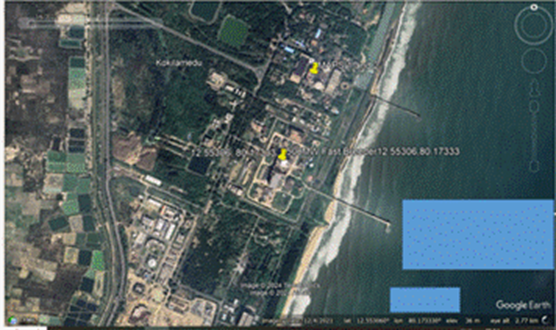The Characteristics of Attacks by World Dam Dynamics on
PROTOTYPE Fast Breeder Reactor at Kalpakkam.
Ramaswami Ashok Kumar, B.E.,M.E., Negentropist, Bombay
Sarvodaya Mandal, 299, Tardeo Road, Nana Chowk, Mumbai-400007.
Copyright © 2024 Ramaswami Ashok Kumar
Figure 1: The world setting of the PROTOTYPE fast breeder reactor at Kalpakkam. A credible scenario of an attack by the World’s dams on the Fast Breeder
.
Figure 2: Location of the Prototype Fast Breeder Reactor at
Kalpakkam.
Figure 3: Anatomy of the hit by World Dam Dynamics on the
PFBR at Kalpakkam:
1.0 What happens when World dam dynamics were to attack the
Prototype FBR at Kalpakkam during the period from February 28 2024 to March 6
2024?
1.1 A total of 1957 dam content changes corresponding to all
1957 earthquakes recorded at USGS during the period were computed from
worldwide earthquake proxy. For each dam content change at any instant due to
all dams worldwide, the suddenly applied pressure, force and water moment were
determined. Using these data the suddenly applied temperature inputs, the
acceleration of the plant to the forces applied were computed. Ten temperatures
measured a million degrees Kelvin or more(twice the core temperature of the sun
of 15 million degrees Kelvin was exceeded during this short period) and 55
temperatures were hundred thousand degrees Kelvin or more.
1.2 The total picture including the averages for the sudden
input temperatures and for the accelerations suddenly induced in the reactor
body is as follows:
The average shock input temperature occurring every 5
minutes is 15 times more than the melting point of uranium oxide in MOX and way
above that of plutonium oxide(See section 2 below).
1.3 The Kalpakkam area is hot with the soil radiating heat as shown by the picture (Figure 4) for the Fires in the region from FIRMS Fire Map of NASA for 9 March 2024:
Figure
4: The Soutjheast Indian peninsula is burning hot on 9 March 2024 as well on
the subsequent days.
2.0 The gradients of dam content change totally worldwide at
any instant is an indication of risk of developing critical masses of plutonium
within the reactor station envelope.
2.1 Study the following table as the earthquake location
changes from place to place through the process of World Dam Dynamics:
2.2
Study the following excerpt from (1):
“…the
melting points and boiling points of plutonium and uranium oxides are not the
same. The MP of plutonium oxide in MOX is 2701 degrees C but that of the
Uranium oxide is 3120 degrees C (Popov et al 2000). Therefore when a mixture of
these boils, there will be fractional distillation of the plutonium oxide,
separation of the mixture, just as happens with alcohol distillation from
alcohol water mixtures or the fractional distillation of crude oil. Thus
plutonium will become concentrated in the vapour and in the nearest cooler
areas w(h)ere the vapour condenses. This would inevitably lead to a nuclear
explosion when the concentration of plutonium exceeded the critical level for
chain reaction. It is not only in MOX fuel that plutonium exists in nuclear
reactors. It is produced as a result of the neutron irradiation of uranium fuel.
[…]” End of Quote.
From
Table 2 it is seen that within a second the melting points of uranium and
plutonium are reached posing the risk of criticality of deposited plutonium.
2.3 How many potential critical mass risk instances are observed during the period under
study?
A
total of 127 dam content changes worldwide caused the PFBR reactor shock input
temperatures to be between 7000 K and 43 million degrees K. This is 6.5% of the
1957 numbers of dam content changes
observed during the period from 28 Feb 2024 to 6 Mar 2024.
3.
References.
1.
Ramaswami Ashok Kumar.2018. PERFECT DESIGNS. DAMS CAUSED FUKUSHIMA DAICHI TO
MELT AND EXPLODE.
Link: https://livingnormally.blogspot.com/2017/12/dams-caused-fukushima-daichi-to-melt.html





